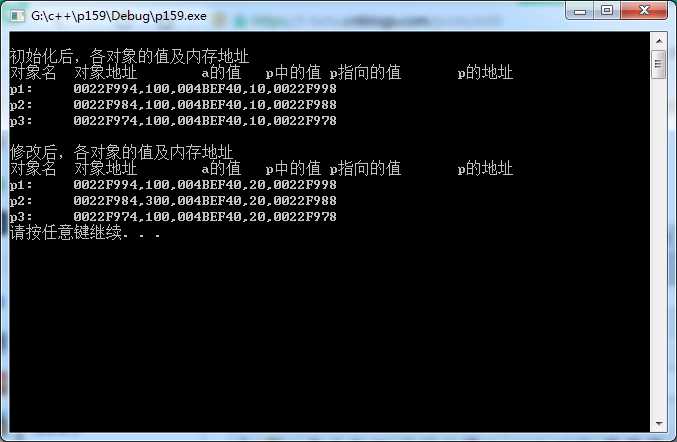标签:names end his pointer 默认 构造 mes str com
源程序:
#include<iostream>
using namespace std;
class pointer
{
public:
int a;
int *p; //指向整型数的指针
pointer()
{
a=100;
p=new int(10);
}
pointer(const pointer &tempp)
{
if(this != &tempp)
{
a=tempp.a;
p=tempp.p;
}
}
};
int main()
{
pointer p1; //使用默认构造函数
pointer p2(p1); //使用复制构造函数
pointer p3=p1; //使用复制构造函数
cout<<"\n初始化后,各对象的值及内存地址"<<endl;
cout<<"对象名\t对象地址 a的值 p中的值 p指向的值 p的地址"<<endl;
cout<<"p1:\t"<<&p1<<","<<p1.a<<","<<p1.p<<","<<*p1.p<<","<<&p1.p<<endl;
cout<<"p2:\t"<<&p2<<","<<p2.a<<","<<p2.p<<","<<*p2.p<<","<<&p2.p<<endl;
cout<<"p3:\t"<<&p3<<","<<p3.a<<","<<p3.p<<","<<*p3.p<<","<<&p3.p<<endl;
*p1.p=20;
p2.a=300;
cout<<"\n修改后,各对象的值及内存地址"<<endl;
cout<<"对象名\t对象地址 a的值 p中的值 p指向的值 p的地址"<<endl;
cout<<"p1:\t"<<&p1<<","<<p1.a<<","<<p1.p<<","<<*p1.p<<","<<&p1.p<<endl;
cout<<"p2:\t"<<&p2<<","<<p2.a<<","<<p2.p<<","<<*p2.p<<","<<&p2.p<<endl;
cout<<"p3:\t"<<&p3<<","<<p3.a<<","<<p3.p<<","<<*p3.p<<","<<&p3.p<<endl;
return 0;
}
运行结果:

标签:names end his pointer 默认 构造 mes str com
原文地址:https://www.cnblogs.com/duanqibo/p/12259057.html